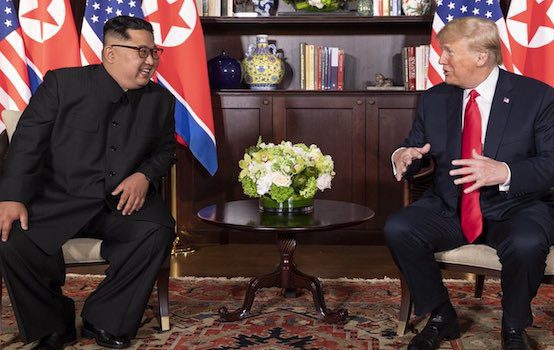Biegun’s Unpersuasive Case for a Failed North Korea Policy

The U.S. special North Korea envoy, Steve Biegun, delivered a speech yesterday that shows just how far removed from reality the administration’s North Korea policy still is:
For us to make progress toward peace and take major steps toward transforming our relationship, North Korea must also be willing to fulfill its commitment to achieve complete denuclearization. North Korea will never be able to realize its full economic potential or enjoy true security and stability if it clings to weapons of mass destruction. The United States and the world will not accept that.
Here we see some of the major flaws in the administration’s approach. First, Biegun asserts that North Korea has to fulfill a commitment to “complete denuclearization” that their government has never really made. That means the administration doesn’t understand North Korea’s position, and it continues to mistake North Korean statements about denuclearization as proof of a willingness to accept unilateral disarmament. Then there is Biegun’s bizarre assertion that North Korea will never enjoy “true security” if it retains its nuclear weapons. No one believes that North Korea is less secure now that it has a nuclear arsenal and the means to deliver it, and the North Korean government certainly doesn’t believe that. They have seen what happens to pariah governments that give up their nuclear weapons programs, so they aren’t going to make that mistake. Finally, there is the rigidity of the U.S. position and the unfounded assumption that the rest of the world agrees with the administration’s inflexibility. Biegun claims that the U.S. won’t accept North Korea’s retention of its nuclear weapons, but it must have dawned on him and the rest of the administration by now that there is nothing that the U.S. could do to make them give up those weapons short of a catastrophic war. At some point, the U.S. government will have to admit that North Korea is going to possess some nuclear weapons in the future, and the things to be negotiated will be how many they keep and deploy.
Biegun lays out what he thinks the consequences of failing to disarm North Korea will be:
As always, there are consequences for failure, and I fear Dr. Kissinger is correct that if the international community fails in this undertaking, North Korea will not be the last state in East Asia to acquire nuclear weapons.
It is always possible that other states in the region might decide to acquire their own nuclear weapons, but how likely is it really? Biegun warns that a “North Korea that retains the ability to threaten its neighbors with nuclear weapons risks breaking the international non-proliferation consensus built over 50 years,” but how much of a danger is there that this consensus will fall apart because North Korea retains its nuclear weapons? The international non-proliferation consensus did not collapse when India and Pakistan both acquired their nuclear arsenals starting more than twenty years ago. Israel started building its nuclear arsenal more than fifty years ago. The international non-proliferation consensus that Biegun worries about seems to be stronger than he thinks, and it has survived other isolated episodes of nuclear proliferation by states that were not part of the Non-Proliferation Treaty. North Korea has possessed nuclear weapons for more than a decade, and in that time there have been no attempts by any other state to follow its example. Far from abandoning its commitments under the NPT, Iran has respected them despite being given strong incentives to do the opposite. It seems to me that Biegun is conjuring up the specter of widespread nuclear proliferation to try to scare people into buying into a North Korea policy that can’t work.
Six months after the failure at Hanoi, and well over a year after the unsuccessful Singapore summit, the administration remains wedded to an unachievable goal, and their continued pursuit of that fantasy squanders an opportunity to negotiate a more modest but realistic arms control agreement.
Comments